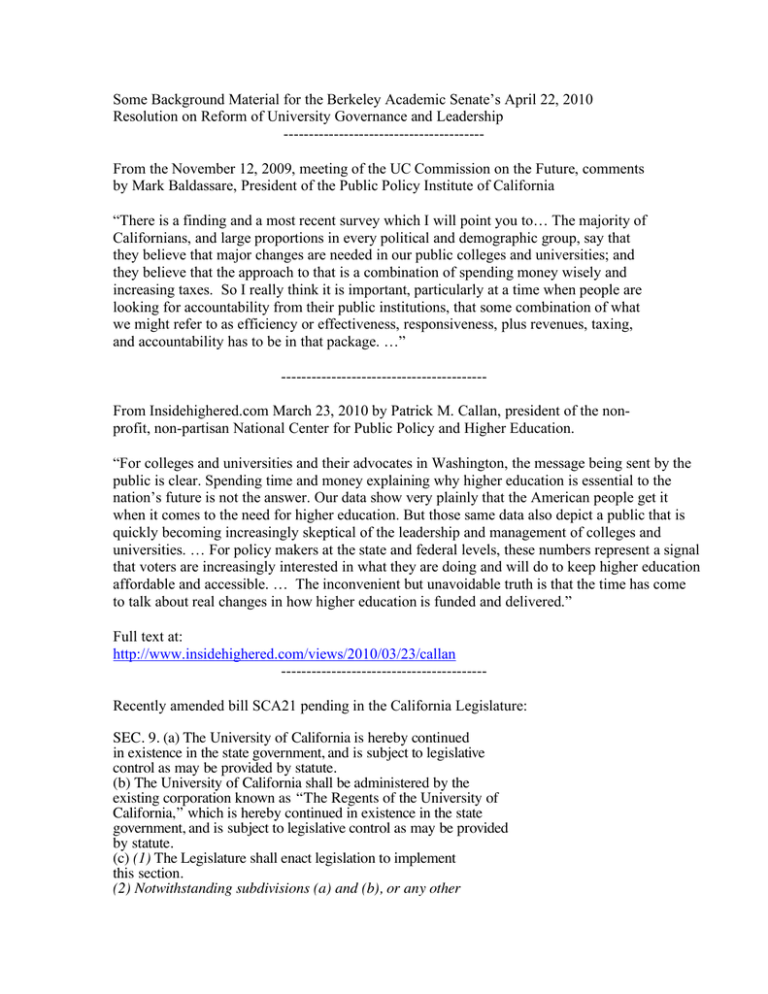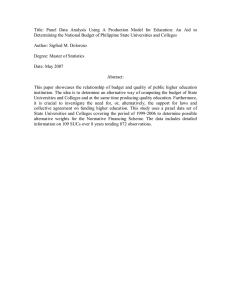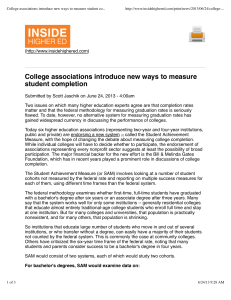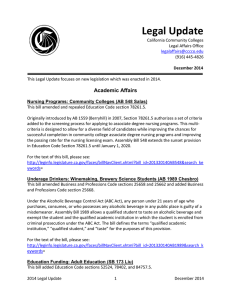Some Background Material for the Berkeley Academic Senate’s April 22,... Resolution on Reform of University Governance and Leadership
advertisement

Some Background Material for the Berkeley Academic Senate’s April 22, 2010 Resolution on Reform of University Governance and Leadership ---------------------------------------From the November 12, 2009, meeting of the UC Commission on the Future, comments by Mark Baldassare, President of the Public Policy Institute of California “There is a finding and a most recent survey which I will point you to… The majority of Californians, and large proportions in every political and demographic group, say that they believe that major changes are needed in our public colleges and universities; and they believe that the approach to that is a combination of spending money wisely and increasing taxes. So I really think it is important, particularly at a time when people are looking for accountability from their public institutions, that some combination of what we might refer to as efficiency or effectiveness, responsiveness, plus revenues, taxing, and accountability has to be in that package. …” ----------------------------------------From Insidehighered.com March 23, 2010 by Patrick M. Callan, president of the nonprofit, non-partisan National Center for Public Policy and Higher Education. “For colleges and universities and their advocates in Washington, the message being sent by the public is clear. Spending time and money explaining why higher education is essential to the nation’s future is not the answer. Our data show very plainly that the American people get it when it comes to the need for higher education. But those same data also depict a public that is quickly becoming increasingly skeptical of the leadership and management of colleges and universities. … For policy makers at the state and federal levels, these numbers represent a signal that voters are increasingly interested in what they are doing and will do to keep higher education affordable and accessible. … The inconvenient but unavoidable truth is that the time has come to talk about real changes in how higher education is funded and delivered.” Full text at: http://www.insidehighered.com/views/2010/03/23/callan ----------------------------------------Recently amended bill SCA21 pending in the California Legislature: SEC. 9. (a) The University of California is hereby continued in existence in the state government, and is subject to legislative control as may be provided by statute. (b) The University of California shall be administered by the existing corporation known as “The Regents of the University of California,” which is hereby continued in existence in the state government, and is subject to legislative control as may be provided by statute. (c) (1) The Legislature shall enact legislation to implement this section. (2) Notwithstanding subdivisions (a) and (b), or any other provision of this Constitution, the Legislature shall not enact any law that restrains academic freedom within the University of California or imposes educational or curricular requirements on students enrolled at the University of California. (3) As used in this subdivision, “academic freedom” means the freedom to discuss all relevant matters in the classroom, to explore all avenues of scholarship, research, and creative expression, and to speak or write without institutional discipline or restraint on matters of public concern as well as matters related to professional duties and the functioning of the university. (d) This section shall become operative on January 1, 2011. Full text at: http://www.leginfo.ca.gov/cgibin/postquery?bill_number=sca_21&sess=CUR&house=B&author=yee -----------------------------------------From a Resolution of the Berkeley Division of the Academic Senate, May 6, 1992: [W]e take this opportunity to declare a position of principle, as follows, which we advocate for adoption by the Regents of the University of California and by the governing bodies of all other universities as well: It should be the policy at any institution of higher learning that the total compensation paid to any executive officer should not exceed twice the average amount paid to its Full Professors. Full text at: http://academic-senate.berkeley.edu/archives/documents/ExecCompResolution19921.pdf ------------------------------------------Compiled by C. Schwartz 4/10/2010





